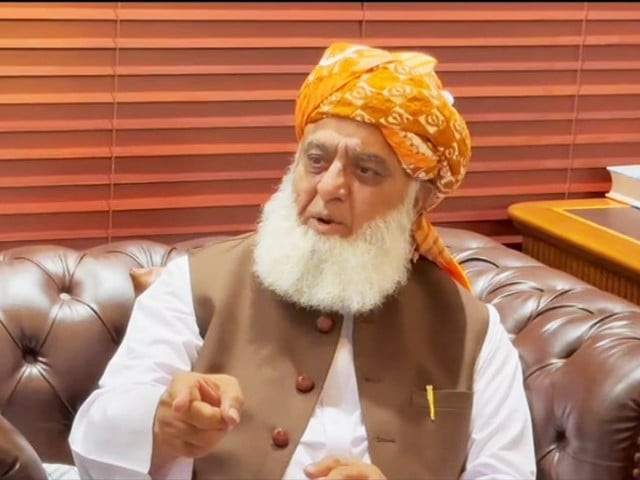Fazl wants riba case appeals expedited
JUI-F chief commends SC's last week decision in Mubarak Ahmad Sani case

JUI-F chief Maulana Fazlur Rehman has urged Chief Justice of Pakistan Qazi Faez Isa to expedite the hearing of appeals filed by traditional banks against a Federal Shariat Court (FSC) order regarding interest-based banking.
In April 2022, the FSC delivered a verdict in a long-standing case on riba (interest), declaring the current interest-based banking system to be against Sharia.
The court directed the government to facilitate all loans under an interest-free system, amending relevant laws, and ordered the banking system to be interest-free by December 2027. Subsequently, traditional banks appealed to the Supreme Court against the FSC order.
Referring to the FSC's verdict, the JUI-F chief said the decision mandates transforming the financial system into an interest-free one within five years. He urged the Supreme Court to promptly address the banks' appeals, arguing that this would allow the government to take necessary steps toward establishing an interest-free financial framework.
The JUI-F chief also commended the Supreme Court's recent decision to expunge certain portions of its earlier orders in the Mubarak Ahmad Sani case. He said an earlier release of the detailed verdict would be a source of comfort for the Muslims of this country.
In an unprecedented move, the Supreme Court on August 22 amended its February 6, 2024, order and July 24 verdict in the Mubarak Ahmad Sani case, expunging all controversial paragraphs as it accepted the federal government's miscellaneous application for amendments in the case's review decision.
The court ruled that the expunged paragraphs cannot be used as judicial precedent in the future.
Religious scholars, including Fazlur Rehman, Mufti Taqi Usmani, and others, had urged the court to remove paragraphs 7, 42, and 49-C from the verdict, citing concerns over the interpretation of proselytization.
The case involved an Ahmadi man, who was granted bail on February 6, 2024, by a three-member bench of the Supreme Court led by Chief Justice Qazi Faez Isa.
Sani had been accused of an offense in 2019 and subsequently convicted under the Punjab Holy Quran (Printing and Recording) (Amendment) Act, 2021.
The bench had noted that the offense with which the defendant was charged had not been criminalized until 2021. As a result, Sani was granted bail, and his immediate release was ordered.
Following this decision, a campaign was launched against Chief Justice Isa, despite the Supreme Court issuing a clarification regarding the order.



















COMMENTS
Comments are moderated and generally will be posted if they are on-topic and not abusive.
For more information, please see our Comments FAQ